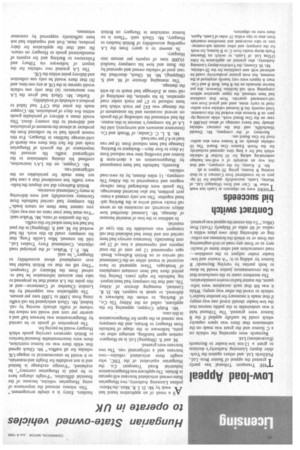Hungarian State-owned vehicles to operate in UK
Page 44

If you've noticed an error in this article please click here to report it so we can fix it.
Na result of an application heard last week by Mr. D. I. R. Muir, the Metropolitan Licensing Authority, two Hungarian State-owned articulated boxvans will operate in Britain. The applicant was Hungarocamion Industrial Road Transport Co. the Hungarian equivalent of the THC, who sought three articulated vehicles—two boxvans and a refrigerated van. The two boxvans were granted.
M. and S. (Shipping) Ltd. is an Hungarocamion agent handling, amongst other imports, holloware in the shape of bathtubs from Hungary to Britain, and the company was named as the agent for Hungarocamion in this case.
Mr. Ralph Cropper, appearing for the applicant, called on the Abbey Tile Co., of Barking, to whom the holloware is delivered, to speak in support. Mr. D. R. Linstead, managing director of Abbey Tile, said that his company had been importing bathtubs for eight years. During this period there had been constant complaints of breakages. These appeared to have occurred in transit either on the Continental rail service or on British Railways. Breakages represented 12 per cent of the total imports and represented a loss of 25 per cent financially. Insurance surveys had been carried out and these had indicated that rail transport was unsuitable for this type of material.
In addition to the loss of material because of damage, Mr. Linstead described how delays occurred; on occasions six or seven rail trucks would arrive at the Barking railhead together. This not only created a transport problem, but also incurred demurrage. The goods were discharged from railway wagons and transported to the Abbey Tile company, 1+ miles distant, by its own road vehicles.
Recently, bathtubs had been transported by Hungarocamion on a short-term B licence and travelling time was reduced from 14 days to four days—Budapest to Barking. Damage had been reduced from 18 per van load to 4.5 per van load.
Mr. S. L. C. Candar, of Wendt and Co. (insurance assessors and surveyors), told the LA of his company's interest in this matter. He had witnessed the unloading of the goods on several occasions and his assessment of the damage was £42 per truck which had been reduced to £7 per truck under road operation. In his opinion, the switching of rail vans at Zubrugge had much to do with the damage.
The managing director of M. and S. (Shipping), Mr. M. Gluck, described the vast pool of vehicles owned and operated by the State and how his company handled 10,000 tons of exports per annum into Hungary.
In answer to a query from the LA regarding accessibility of British hauliers to Hungary, Mr. Gluck said: "There is no licence restriction in Hungary on British hauliers. Entry is a simple arrangement."
This witness stressed the importance of using Hungarian vehicles, because of the financial difficulties. "Freight charges have to be paid in Hungarian currency", he explained, "Foreign exchange is limited and is not available for freight and materials, so it would be uneconomical to engage UK vehicles for all traffics." Mr. Gluck agreed that while there was no licence restriction, there were insurmountable financial barriers to British operators carrying goods which Hungary would be paying for.
The proportion of goods to be carried by Hungarocamion was between half and a quarter per cent and would not reduce the volume of traffic already moving by rail. Indeed, Mr. Gluck anticipated his rail traffic rising from 3,000 to 5,000 tons per annum.
The application was supported by the London Chamber of Commerce—and at this point the LA stated that he proposed to take into account information he had received from the Ministry of Transport. "They tell me that no British haulier has ever complained about accessibility to Hungary", he said.
Mr. F. J. Walker, of the principal road objector, Continental Ferry Trailers Ltd., told his counsel, Miss Lucille Fung, that his company could do this work. He had worked for M. and S. (Shipping) in the past but had not been asked for this traffic.
On the question of rates, Mr. Walker said: "You must base your rates on one way only; you cannot base them on return loads." His company had carried bathtubs from Germany successfully and were delivering in many Continental countries.
British Railways did not dispute the holloware traffic but considered that a case had not been made for perishables on the refrigerated van.
Mr. Cropper, on the LA's instruction, confined his closing submission to the refrigerated traffic. He stressed the importance of the growth of Hungarian trade and the fact that there was dearth of cold-storage facilities in Hungary. For this reason goods had to be collected from the producer at almost the moment of production and delivered to this country direct. This would mean a delivery of perishable goods within five days of production. Mr. Cropper made the point that CFT had failed to produce a schedule of availability.
Earlier, Mr. Gluck had given the LA two assurances: (a) that only one vehicle would operate in the UK at any onetime, and (b) that there would be only one collection and delivery point within the UK.
The LA granted two vehicles for the import of holloware via Tilbury and Felixstowe to Barking and for exports of manufactured goods to Hungary on return. He said that the application for dairy produce, meat, fruit and vegetables had not been sufficiently supported by customer witnesses.




























































































































